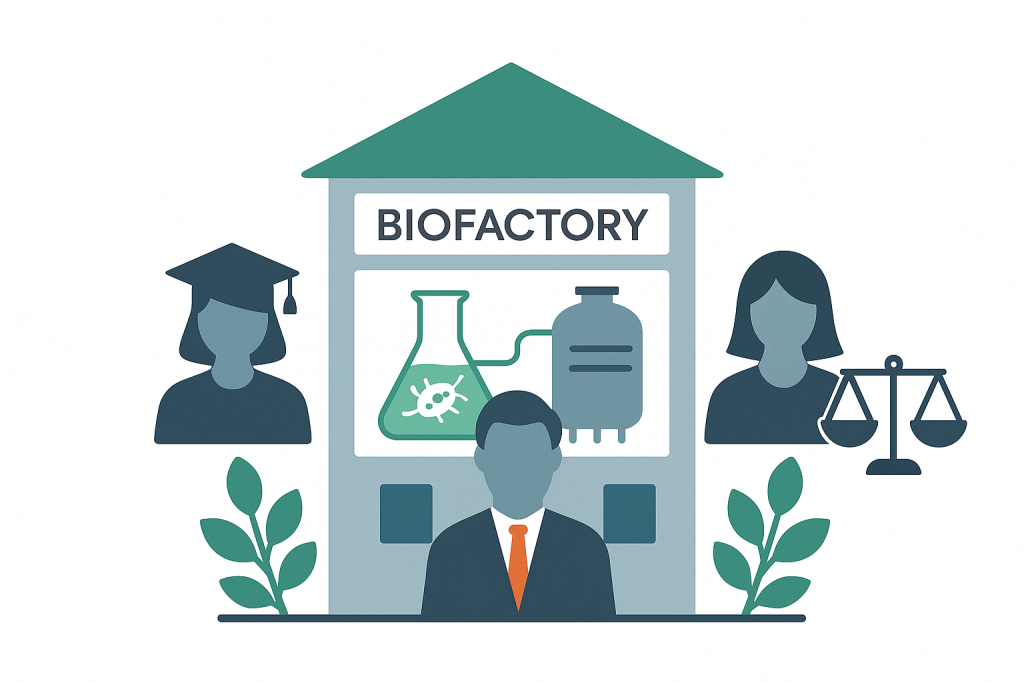Biology is leaving the lab and moving into neighborhoods—and it’s bringing a new kind of economy with it.
The Rise of Local Bio-Manufacturing
Factories are getting smaller, smarter, and more alive.
Industrial production once required sprawling facilities, heavy machinery, and global supply chains. Now, bio-manufacturing hubs—compact facilities using engineered cells and microbes—are emerging in cities, campuses, and even schools.
These hubs don’t forge steel or mold plastic. They grow materials—everything from biodegradable packaging and textiles to pharmaceuticals and fertilizers—using biology as their engine.
This shift from mechanical to biological production has profound implications for how communities learn, work, and govern technology. The “biofactory next door” could reshape local economies as deeply as the internet reshaped communication.
Education for the Living Economy
Students won’t just study biology—they’ll work with it.
As biology becomes a design tool, education systems must evolve to teach not just what life is, but how to work with it responsibly.
Schools and universities are beginning to integrate synthetic biology and bio-design into vocational and STEM programs. Instead of training for industrial assembly lines, students learn to operate bioreactors, genetic design software, and circular resource systems.
Imagine a high school lab where students:
- Grow mycelium-based packaging instead of cutting wood.
- Program algae to produce dyes for textiles.
- Use bacterial cultures to clean wastewater.
This is applied biology as a career pathway—combining sustainability, creativity, and ethics. It’s hands-on, high-impact learning for the post-industrial generation.
The New Workforce: Technicians, Designers, and Stewards
Biology will create jobs that don’t exist yet—but they’ll look more local than global.
Community biofoundries and small-scale production labs will need a range of roles:
- Bio-technicians who manage living cultures.
- Bio-designers who translate DNA sequences into materials or products.
- Data specialists who monitor and optimize bioprocesses.
- Safety and ethics officers who ensure responsible use of biological tools.
Unlike traditional industrial jobs, these positions emphasize collaboration with living systems rather than control over machines. They also tend to be regionally distributed, making them ideal for small towns and urban communities alike.
Bio-manufacturing could revitalize local economies by turning sustainability into employment—linking ecological repair with economic growth.
Community-Scale Production: Opportunity and Oversight
When biology becomes local, governance becomes personal.
The same accessibility that makes local bio-production empowering also introduces risk. Engineered organisms, even safe ones, require oversight to prevent misuse or environmental disruption.
This creates a new layer of civic responsibility: bio-literacy at the community level. Towns and regions adopting local bio-manufacturing will need shared protocols for:
- Containment and safety: Preventing accidental release or contamination.
- Transparency: Tracking the origin, purpose, and impact of biological products.
- Ethical review: Ensuring innovations align with local values and ecological priorities.
Community bio-boards—akin to school boards or zoning committees—may soon be tasked with regulating local biotechnology projects. Public trust will depend on open dialogue, not secrecy.
Ethics: The New Core Curriculum
With power this fundamental, ethics can’t be optional.
When life becomes programmable, every decision about design carries moral weight. Should students grow organisms that alter local ecosystems? Should communities patent living materials?
Ethical education must keep pace with scientific ability. Programs in bioethics, environmental stewardship, and data responsibility should accompany every technical course.
Future-ready education will teach not just “how to make,” but “why—and whether—we should.” The ethical literacy built through this approach will be as important as technical skill in maintaining public safety and trust.
Local Bio-Manufacturing as Civic Infrastructure
The biofactory next door isn’t just an industrial site—it’s part of the social fabric.
Like a library or a power grid, local bio-manufacturing hubs can serve public needs:
- Producing materials for community construction projects.
- Processing local waste into compost or biofuels.
- Generating new kinds of jobs through circular innovation.
But their integration requires education, regulation, and inclusion. Communities must understand how to engage with these systems—whether as workers, decision-makers, or watchdogs.
If managed well, these hubs could become community-owned assets, supporting local self-sufficiency while contributing to national sustainability goals.
Preparing the Next Generation
Parents, educators, and civic leaders hold the blueprint for this transition.
Students entering today’s classrooms will graduate into an economy where biology and data converge. Teaching them how to think critically about life-based design—its risks, rewards, and responsibilities—will define whether this technology empowers or divides.
Schools that embrace bio-literacy now will prepare students not just for jobs, but for leadership in the living economy.
Conclusion: Growing Responsibility Alongside Growth
The “biofactory next door” represents more than new technology—it’s a cultural shift toward living production, where work, education, and ethics intertwine.
If built with transparency and care, local bio-manufacturing can deliver what industrial revolutions never did: prosperity aligned with ecological balance.
In the age of biology, the future won’t just be manufactured. It will be cultivated.


